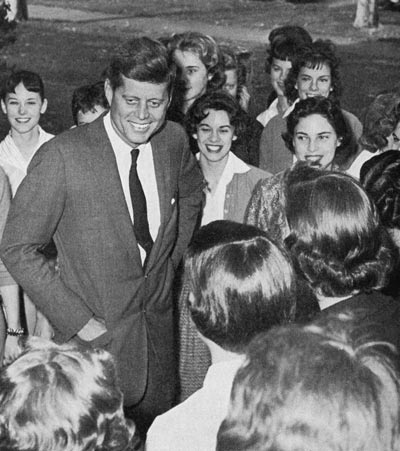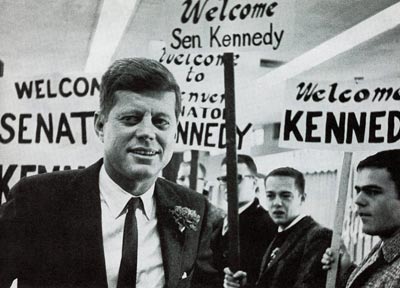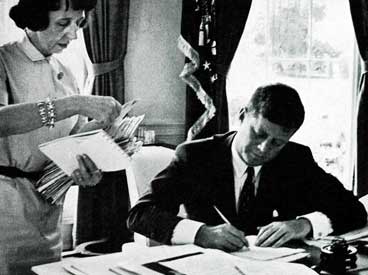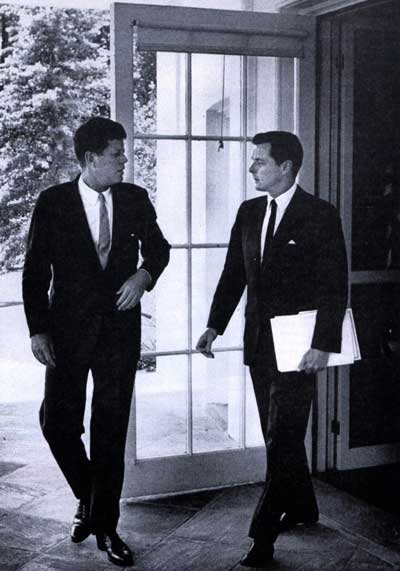Kennedy on the Campaign Trail
This is the second installment of our series “Reconstructing Kennedy.” Click here to read part one, “A Very Eligible Politician.”

We tend to remember him as president; it’s hard to remember that shortly before he ran for office, John F. Kennedy was as a relatively unknown young senator, and that once he was in the race, he faced serious obstacles in his bid for the presidency. But that was his situation in early 1960, when Post reporter Stewart Alsop listed ten reasons Kennedy might not win his party’s nomination.
The first was religion. No Catholic had ever successfully run for president, and many Americans in 1960 wondered if the country was ready for a Catholic in the White House. Throughout the presidential campaign, Kennedy worked hard to convince voters his religion would not shape his executive decisions. Yet the doubts persisted. In “Campaigning With Kennedy,” Post reporter Beverly Smith wrote of being present when a reporter read a statement from protestant ministers suggesting Kennedy’s decisions might be shaped by the Vatican.
Smith could see Kennedy working hard to control his anger and return a civil response. “We saw the flush spread upward from his throat into his tanned, suddenly tense face.” But when Kennedy responded, it was in a calm, controlled, but icy voice. “Our Constitution is very clear on the separation of church and state; I have been very clear—and precise—in my commitments to that Constitution, not merely because I take the oath which is taken to God but also because I believe it represents the happiest arrangement for the organization of a society.”
He went on to remind his questioners the Constitution forbade setting any religious qualification for the presidential office.
Another obstacle was Kennedy’s family background. His father, Joseph P. Kennedy, had made a quarter of a billion dollars as a stock market speculator and liquor importer (though never in bootleg alcohol, despite the rumors.) Along the way to acquiring his fortune, Joseph had made “a whole slew of enemies,” which John inherited.
He also inherited the suspicion that Joe Kennedy would buy his son’s election to the White House, and then tell John how to run the country. But from very early in the campaign, John asserted that he would not be shaped by his father’s more conservative politics, wrote Smith. “When the older Kennedy is moved to express his political views, which are rather to the right of his friend Herbert Hoover’s, his son is apt to break in with, ‘We’ve heard the former ambassador’s views, now let’s get on with our business.’”
Kennedy’s campaign benefitted from the powerful support of his siblings. His four sisters and two brothers had worked hard in his Massachusetts campaigns for Congress and the Senate. When he announced in 1959 that he intended to run for president, they pooled their money and bought him a private airplane, complete with sleeping quarters. The gift plane, wrote Stewart Alsop, showed Kennedy’s opponents what his Massachusetts challengers had already learned, “When you run against Jack, you aren’t running against just one Kennedy, but the whole tribe.”
“His two brothers,” Alsop continued, “are already working hard for him. They are Bob Kennedy, nationally known for his work as counsel… investigating racketeering in the labor-management field; and the youngest brother, Ted, a husky ex-footballer and recent graduate of the University of Virginia Law School.”

Smith believed John Kennedy’s greatest family asset, though, was his wife, Jacqueline. “Reporters covering the Kennedy campaigns wondered at first how a very shy, very beautiful, very young woman would go down with the voters as a potential first lady. By the time the West Virginia campaign ended, they were unanimously convinced that the beautiful Jackie was a major Kennedy political asset.”
Another obstacle in Kennedy’s campaign was his youth. Many voters refused to believe a 43-year-old man without executive experience could run the country. But while his youth lost him the senior vote, it gained him supporters in the younger generation. Smith observed, “In each state I visited with Kennedy, I was impressed by the number of youthful volunteers working ardently for his cause… [They reminded me] that Theodore Roosevelt entered the White House at forty-two, Washington took command of the Continental Army at forty-three, and Thomas Jefferson drafted the Declaration of Independence when he was thirty-three.”
The young voters of 1960 who rallied to Kennedy’s cause had been born in the Depression, grown up during a world war, and reached maturity as America entered a seemingly endless cold war with a possible risk of nuclear war. By the time the 1950s drew to a close, they had grown tired of the continuing crises. They wanted a freedom from worry and a world of opportunity in which they could make their mark. And, like so many of their elders, they wanted to make the world a better place. Kennedy spoke directly to these yearnings, but in an unexpected manner.
“When he gets down to the substance of his speeches, he preaches a hard gospel,” Smith observed. “In politics this is unusual, if not unpalatable. American voters are used to being told that they are the salt of the earth and there’s a good time coming. Kennedy’s message is quite different. He does not flatter or talk down.” To illustrate, Smith offered a typical quote from one of Kennedy’s speeches: “Ours is a great country, but we can make it a greater country. It is powerful, but we must make it more powerful. I ask your help. I promise you no sure solutions, no easy life. The years ahead, for all of us, will be as difficult as any in our history. There are new frontiers for America to conquer—frontiers of the mind, the will, the spirit of man.”
Such words had an unusual effect on the crowds. While Kennedy told them they had better prepare for harder work and stricter self-discipline, Smith could see puzzled uneasiness on their faces. But Kennedy argued his point with facts and earnest vitality. When he finished, there would often be a moment of intense silence before a rising ovation began.
Smith’s conclusion reflected the desire for change many Americans felt at the start of a new decade. “It is not that Kennedy has ‘changed’ his audience. But most of us have, beneath our outer optimism, a troubled feeling that we have failed to live up to the greatness of our heritage. It is this chord which Kennedy strikes and brings to life.”
It was a chord that would resonate long after Kennedy was gone.
To read more from the Post‘s series on John F. Kennedy, click here.
A Surprisingly Popular Presidency
This is the fourth installment of our series “Reconstructing Kennedy.”

“I myself believe that he will be remembered as one of the great Presidents.” So wrote Post journalist Joseph Alsop in “The Legacy of John F. Kennedy,” (November 21, 1964), as he considered the late president’s legacy. Kennedy, he asserted, had “courage, energy and common sense, clear-mindedness, practicality, a hearty dislike for slogans of whatever kind, and a flat refusal to admit defeat.”
Such praise seems overdone today, after half a century of investigations into Kennedy’s presidency and personal life. Today, we know he hid the facts of his precarious health from the nation; his many adulterous affairs are common knowledge. We suspect he wanted to assassinate Castro, and we have read of his seemingly reckless actions regarding the Bay of Pigs. Some historians still hold him responsible for our ultimately disastrous involvement in the Vietnam War.
Yet even in hindsight, it’s hard to evaluate a president without considering how his contemporaries viewed him. And a great many Americans in the early 1960s, as we’ve found in Post articles, regarded Kennedy with a limitless admiration. He had charm, humor, intelligence, and unflappable poise.
But there was something more to his appeal.
Although he was a conservative Republican, the Post’s political editor, Stewart Alsop, was just as captivated by Kennedy as his even more conservative brother Joseph, who was actually a personal friend of the president’s. In the September 16, 1961 issue of the Post, Alsop reviewed Kennedy’s first year in the White House (“How’s Kennedy Doing?”)—several months after the president’s disastrous Bay of Pigs invasion. “He had done the impossible. At forty-three he was the youngest President ever elected, and the first Catholic. To do what he had done, he had taken a whole series of breath-taking risks. Often it had seemed that he might lose… But always he had won in the end. Is it any wonder that many of his followers had come to believe in a Kennedy star, to believe that, when the chips were down, Jack Kennedy would always win in the end?”
The next year, Alsop conducted a country-wide survey “to get some notion of how real Kennedy’s popularity is and how deep it goes.” The results of his interviews, which appeared in the Post as “The Mood of America” on September 22, 1962, summed the opinions of 500 voters.
According to the results, Kennedy was maintaining his support. More than half of the interviewees had voted for him, and said they would support him in the next election. Several people who had voted Republican also said they would vote for Kennedy’s re-election. Alsop believed many of these swing voters were people who had overcome their objection to a Catholic in the White House.

Kennedy’s supporters most often described him as “dynamic,” “straightforward,” and “well-educated.’” The chief criticism among those who didn’t support him was, as Alsop expressed it, “He’s rich and knows nothing about the problems of the poor.” The other common objections? “He’s reaching out for too much power”; “He flies off the handle too much”; “Too much family.” This last objection referred to Kennedy’s very politically involved family, including his brothers who served as a state senator and as the nation’s attorney general.
Many of these 500 Americans were also still concerned about the Cold War. Since the end of World War II, America had seen one country after another fall under Soviet rule; some by occupation, as in Eastern Europe, some by invasion, as in Korea.
The Soviet Union seemed to always be one step ahead of the Americans. We didn’t learn the Russians had stolen details of our atomic bomb plans until they detonated their own in 1949. And we only learned how far their space program had advanced after they had successfully launched the first man into space. Russia was training revolutionaries who were now stirring insurrections in Africa, Central America, and Southeast Asia. And now their power had spread to Cuba, where the Russian army was pointing missile launchers at America, just a few hundred miles away.
But according Alsop’s interviews, “only one in five of the interviewees thought there was a ‘big’ danger of war.” Many believed “there would be no war ‘so long as we remain strong.”
Still, many Americans worried the nation was losing its global prominence, as well as the Cold War. They wanted a president who would be tough, someone who wouldn’t back down from a confrontation.
They got what they wanted just a few days after Alsop’s survey appeared in the Post when President Kennedy ordered the U.S. Navy to block Russian ships from delivering missiles to Cuba. He put all branches of the military on highest alert, anticipating the Soviets would retaliate for the blockade. The world never came so close to nuclear war as it did between October 14 and October 28, 1962. Kennedy remained firm but approachable, and ultimately maneuvered the Russians into withdrawing their missiles.
Voters liked Kennedy’s tactics against the communists, even when they weren’t successful. After the Bay of Pigs fiasco—an outright disaster—his approval ratings rose from 78% to 83%. And in the aftermath of the missile crisis, his approval ratings rose from 62% to 74%.
This sense of America regaining the initiative in the Cold War may explain why so many Post articles and editorials were generous with praise for the president. It might explain why Joseph Alsop believed Kennedy had ushered in, “a time of renovation and renewal, when our country found a new and better course after long years of search… He had a vision of this nation’s greatness, which he somehow conveyed to the rest of us.”